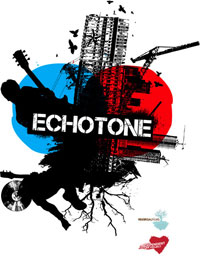South by Southwest, Money, and Noise
The famous/infamous South by Southwest Music Festival forms the climax of Echotone. The previous 75 minutes of the film are spent among the city’s musicians, journalists, photographers, developers, and politicians. It is after living in the kaleidoscope of jackhammers, dancing cranes, instruments analogue and digital, and severed fish heads that we see the rest of the world descend upon this noisy town. These four days structure the center of the music industry (“the music industry’s spring break,” some mumble). Like grackles on a spare tree they roost, bringing over $119 million into Austin’s economy and effectively shutting down the entire city.
While providing this adrenaline, SXSW often comes under fire for its relative negligence of the troves of unsigned musicians who labor day after day in Austin’s many venues.
It’s important to mention SXSW now, as they are currently considering ECHOTONE as a premiere in March (likewise, we are considering if they are the best fit for ECHOTONE to make its first major stand). We don’t want it to feel like a local backyard BBQ where everyone from Austin is patting themselves on the back and pointing out the local record shop that flies past Black Joe Lewis’ window as he delivers fish for Quality Seafood.
Still, there’s the greater emotional vision of what a SXSW premiere could provide for the viewer. At the visceral climax, the credits roll, and the audience walks out into the precisely the world they’ve just experienced for 90 minutes.
One of the film’s heartbeats is its depiction of art and commerce and what that even means in the present day. If even Glenn Danzig can’t make a dime for his music, how does the unsigned, relatively unknown artist survive in this climate? What does that mean for a city that calls itself the “Live Music Capital of the World,” in which musicians collectively bring in a billion dollars a year into its economy apart from SXSW and Austin City Limits?
Before gushing embarrassingly a la a film like Before the Music Dies, we became more interested in the gray areas found between these questions. There is Bill Baird, whose band Sound Team was signed to Capitol Records and subsequently dropped when their album Movie Monster didn’t sell enough copies. There is Black Joe Lewis, who we managed to depict schlepping tilapia in his fish truck while simultaneously blowing up on the world stage with his soul-revivalist outfit The Honeybears. Then there is Cari Palazollo and her group Belaire, formed with Jason Chronis of Voxtrot. Along with their manager Daniel Perlaky (of Indierect Records and City on Fire photography/design), they struggle with the balance of artistic integrity and commercialization of their infectiously catchy music.
It is here that Echotone thrives. In this city, with its distinct personality crisis and among these musicians (and others like Dana Falconberry, The Black Angels, Ghostland Observatory, Machine, The Apeshits, Ume, and the Octopus Project), the noise and distortion makes everything that much more vibrant.
Ecotone: “from a combination of eco(logy) plus -tone, from the Greek tonos or tension – in other words, a place where ecologies are in tension.”
More soon.

